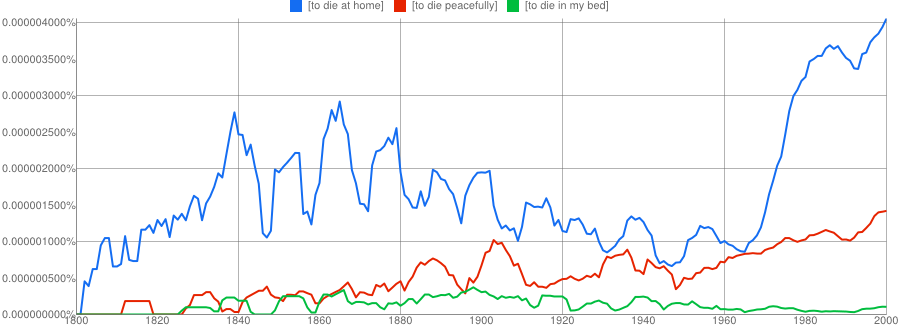It's abstract compared to the physical setting of the mat or bed, and there is debate about what it might entail, but I think it is pertinent as a complement:
To die on one's own terms.
So it's the verb to die and this idiom(see this question); Merriam-Webster says of on one's own terms:
in accordance with one's wishes : in one's own way < prefers to live
on his own terms >
The debate has extended to the manner and time of the passing as well as the place, especially in the context of (degenerative)illness - which is not about old age. But the terms reflect, just like with living, the idea of the freedom and the choice it affords; it's about dignity and nurturing independence, autonomy for as long as possible in the environment of the person's own choosing, and ultimately choice for the human being in the later or final moments of their life. The meaning the person gives to life must also prevail in death, and there is awareness about how the caring must be guided by that. The chosen terms may vary with the individual, their traditions, beliefs etc..1
1. I found the following about the less fortunate scenario of illness. I did not know this person but it is a privilege to share what I read. The late Mr Eric Hampton was a choreographer and ballet instructor from Washington. He was diagnosed with Lou Gehrig's disease in 1997; from what I understand the in-patient unit at Washington Home & Hospice cared for Mr Hampton in the last 2 years of his life when staying home was no longer an option because of the seriousness of his condition. Mr Hampton could no longer talk and used blinking with a plexiglass board with clusters of letters to express his thoughts(a long, and sometimes frustrating process no doubt) - until his death in 2001, age 54, almost 15 years ago. In his last year, Mr Hampton wrote a small diary for 4 weeks. I believe it is insightful so I reproduce in full his last entry from the week of July 3rd, 2000 with no further comments:
When I had to leave my apartment to come and live at the Home, I was
bawling like a baby. To face another night without my darling Bruce,
my brother, would be another night in hell. Of course, Gemima, my
private nurse who stayed with me all through the night for a week, was
a godsend.
I loved my old apartment. It had gone through so many changes. This
last incarnation I liked the best. It had a sand-colored carpet and a
linen sofa with matching chair. I had hung many photographs of my
career and my company's career. I cooked some of my best meals for my
friends at 1884 Columbia Road. Everyone was in the neighborhood.
Butterflied rack of lamb, grilled vegetables, poached pears in red
wine sauce. I loved my life there: dancing, teaching, choreographing,
lovemaking, and entertaining. I had the most spectacular view of
Washington and the monument. I loved my life.
from the diary of Mr Eric Hampton - 2000

